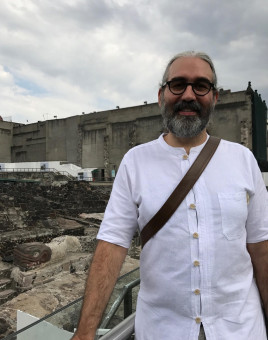
Phillip Barron
Post-Doctoral Fellow
MWF 12-1p
Or by appointment
My role in the classroom is two-fold: to create an inclusive environment and then to provoke students to think critically. Much like Walter Murch, the celebrated film editor, says of the editor’s responsibility to the director, I believe that as an instructor, my role is to listen and clarify. Philosophy underwrites all other disciplines (which is why the “Ph.” in PhD stands for “philosophy”), so studying philosophy is about learning how to appreciate perplexity, how to think (and write) clearly, and how to understand complexity.
Currently, I am a post-doctoral fellow at Lewis & Clark College. I recently defended my dissertation on the metaphysics and phenomenology of personal identity to complete a PhD in Philosophy at the University of Connecticut. I also have research interests in Daoism, Zen (especially nonclassical logics), philosophy of mind, sub-Saharan African philosophy (especially from Ghana), and contemporary phenomenology.
I am also a poet. As a practicing artist, I bring a healthy respect for empirical data about what communities of artists actually do - to balance out philosophers’ tendency toward armchair theorizing about art. In 2011, I founded and edited the online journal OccuPoetry, anthologizing poetry and art of the Occupy Wall Street movement.
During my free time, I love to cook, bike, read, and hike—sometimes all in the same day.
Academic Credentials
PhD 2022 in philosophy, University of Connecticut, MFA 2016 in poetry, San Francisco State University, MA 2003 in philosophy, University of North Carolina at Chapel Hill, BA 2000 University of Massachusetts, Amherst
Teaching
Spring 2024 Courses:
PHIL 217: Topics: Phenomenology & Existentialism
MW 3:00PM - 4:30PM
Introduces students to philosophy through a specific theme or topic. Students investigate how philosophy is represented and enacted in a specific area as well as by participating in its enactment. Possible topics include philosophy and existentialism, philosophy and Latin America, philosophy and literature, philosophy and race, gender, class.
Prerequisites: None.
Research
Book
What Comes from a Thing: poems. Fourteen Hills Press, 2015. Winner of the 2019 Nicolás Guillén Outstanding Book Award for philosophical literature and the 2015 Michael Rubin Book Award.
Articles
- “Who Has Not Wak’d”: Mary Robinson and Cartesian Poetry. Philosophy and Literature 41 (2): 392-399. 2017.
- The Descent of Winter: William Carlos Williams Under the Influence of Paris. S.Ph. Essays and Explorations 1 (2). 2016.
- Gender Discrimination in the U.S. Death Penalty System. Radical Philosophy Review 3 (1): 89-96. 2000.
Professional Experience
Previously, I have taught philosophy courses at the University of Connecticut, California State University at Sacramento, Woodland Community College, and the University of North Carolina at Greensboro. I also worked in the digital humanities at the National Humanities Center, an institute for advanced study in North Carolina, and taught digital humanities courses at the University of California, Davis.
Philosophy is located in room 2nd Floor of John R. Howard Hall on the Undergraduate Campus.
MSC: 45
email phil@lclark.edu
voice 503-768-7450
Chair Joel Martizez
Philosophy
Lewis & Clark
615 S. Palatine Hill Road MSC 45
Portland OR 97219